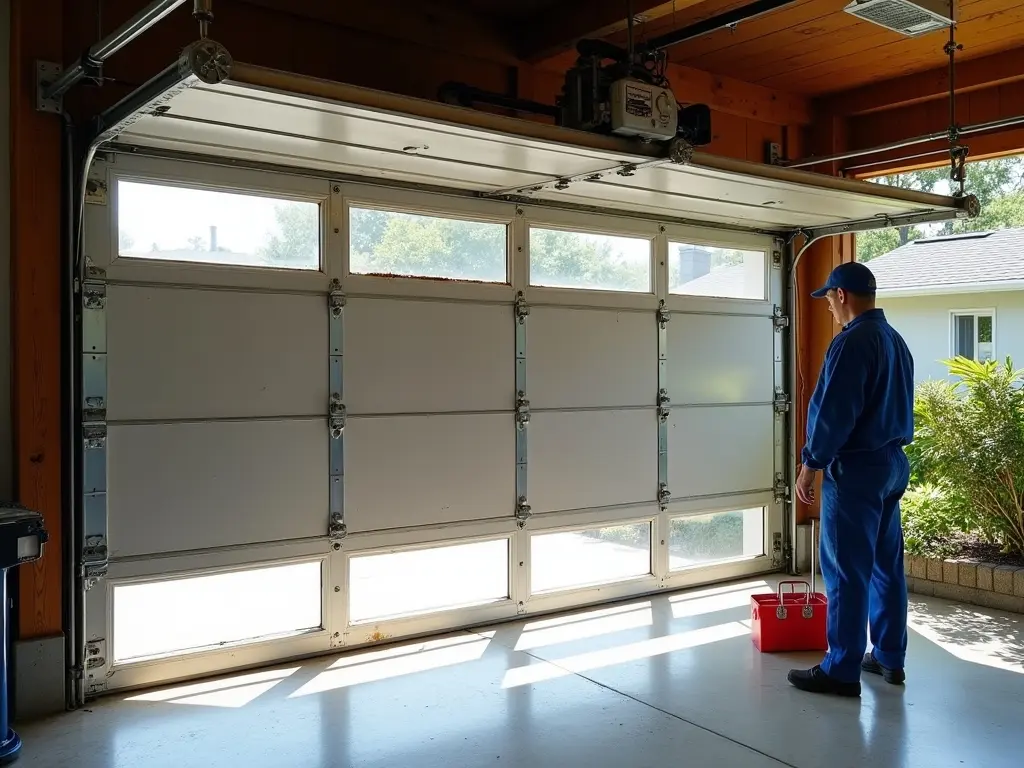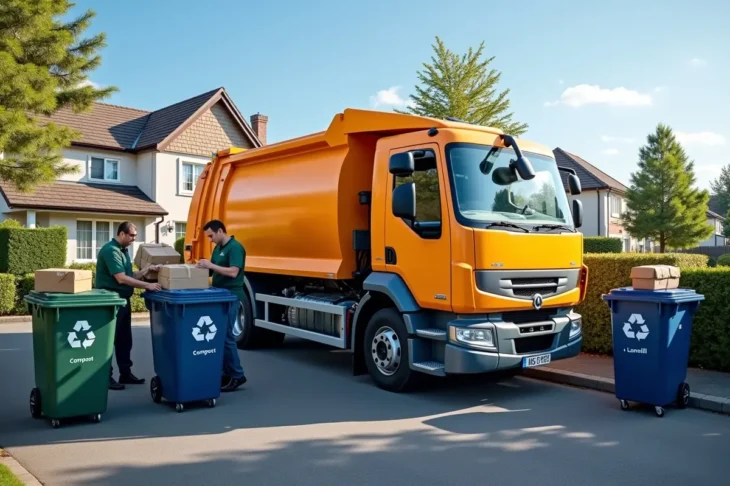
The Real Reason Your Garage Door Is Making That Weird Noise
Your garage door has been making that strange sound for weeks now. You know the one – it squeaks, or grinds, or makes this weird banging noise every time you open or close it. You keep meaning to figure out what’s wrong, but life gets busy and the door still works, so you just ignore it.
The thing is, garage doors don’t make random noises for no reason. Every sound your door makes is trying to tell you something, and some of those messages are more important than others. Understanding what these noises mean can save you from expensive repairs or even dangerous situations.
Contents
The Squeaking That Drives Everyone Crazy
That high-pitched squeaking sound is probably the most common garage door complaint. It’s annoying, it wakes up the neighbors, and it seems to get worse over time. The good news is that squeaking is usually the easiest problem to fix.
Most squeaking comes from parts that need lubrication. The hinges, rollers, and tracks all have metal parts that rub against each other when the door moves. When these parts dry out, they create that fingernails-on-chalkboard sound that makes you cringe.
The solution is pretty simple – a little bit of the right lubricant on the moving parts will usually stop the squeaking. But here’s the important part: you need to use the right kind of lubricant. Regular household oil can actually attract dirt and make the problem worse over time.
Sometimes squeaking means the rollers are wearing out and need replacement. If lubrication doesn’t help, or if the squeaking comes back quickly, the rollers might be damaged or just old. This is when you might want to consider professional garage door repairs adelaide to properly diagnose and fix the issue.
The Grinding Sound That Means Business
If your garage door makes a grinding noise, pay attention. This sound usually means something is seriously wrong, and ignoring it can lead to expensive damage or safety problems.
Grinding often happens when the rollers are damaged or when dirt and debris build up in the tracks. As the door tries to move, the damaged rollers scrape against the track instead of rolling smoothly. This damages both the rollers and the track, making the problem worse over time.
Another cause of grinding is when the garage door opener motor is struggling. If the door is too heavy or if something is blocking the mechanism, the motor works harder than it should. This extra strain creates a grinding sound and can burn out the motor if it continues.
Chain-driven garage door openers can also make grinding noises when the chain gets loose or when the sprockets wear down. This type of grinding usually happens at the beginning or end of the door’s movement, when the chain is under the most stress.
Banging and Rattling That Gets Your Attention
When your garage door starts making banging or rattling sounds, something is definitely loose or broken. These noises are hard to ignore, and they usually get worse quickly if you don’t address them.
Loose bolts and screws are common causes of rattling. Over time, the constant movement of the garage door can cause hardware to work loose. This creates rattling sounds as parts move around more than they should. The fix is usually simple – tighten the loose hardware – but you need to find all the loose spots.
Banging sounds often mean that springs or cables are having problems. These are the parts that help lift the heavy garage door, and they’re under a lot of tension. When they start to fail, they can create loud banging noises that are both alarming and dangerous.
Weather can also cause banging and rattling. Wind can make the garage door panels flex and create noise, especially if the door is old or if the panels are loose. Temperature changes can cause metal parts to expand and contract, which sometimes creates temporary rattling sounds.
The Clicking That Might Be Normal (Or Not)
Clicking sounds from garage doors can be tricky to figure out. Sometimes clicking is completely normal, but other times it indicates a problem that needs attention.
Normal clicking usually comes from the garage door opener’s safety mechanisms. Many openers make clicking sounds when they start up or when they reach the end of their travel. These are usually just the mechanical parts engaging and disengaging as they should.
Problem clicking often happens when the opener’s drive mechanism is having trouble. Worn gears can create rapid clicking sounds, especially when the door is under load. This type of clicking usually gets worse over time and might be accompanied by the door moving more slowly.
Safety sensors can also cause clicking sounds. If the sensors that prevent the door from closing on objects get dirty or misaligned, they might click as they try to communicate with the opener. This can also cause the door to reverse or refuse to close properly.
Humming Without Movement
If your garage door opener hums but the door doesn’t move, you have a problem that needs immediate attention. This usually means the motor is trying to work but something is preventing the door from moving.
The most common cause is a broken spring. Garage door springs do most of the work of lifting the heavy door, and when they break, the opener motor can’t handle the full weight by itself. The motor hums as it tries to lift the door, but nothing happens.
Sometimes the problem is that something is blocking the door’s movement. Check the tracks for objects, ice, or debris that might be preventing the door from moving. Also look for anything that might be caught in the door mechanism.
A humming motor can also indicate electrical problems or a motor that’s starting to fail. If the door has been getting slower or having trouble opening fully, the motor might be wearing out and struggling to do its job.
When Silence Means Trouble
Sometimes the most concerning sound from your garage door is no sound at all. If your door has always made some noise during operation and suddenly becomes silent, that can indicate a serious problem.
Complete silence might mean that the garage door opener has stopped working entirely. This could be due to electrical problems, a blown fuse, or a motor that has failed completely. Check that the opener is getting power and that all switches are working properly.
If the door moves but makes no sound at all, some of the moving parts might have broken completely. Springs, cables, or rollers that break sometimes cause the door to operate differently, often more quietly but also less safely.
What These Noises Really Mean for You
The key thing to understand about garage door noises is that they’re warning signs. Your door is trying to tell you that something needs attention before it becomes a bigger problem.
Small issues like squeaking hinges are easy and cheap to fix. Bigger problems like broken springs or failing motors are expensive and potentially dangerous. The sooner you address the noises, the more likely you are to avoid costly repairs and safety hazards.
Some garage door problems can be dangerous to fix yourself, especially anything involving springs or cables. These parts are under high tension and can cause serious injury if they’re not handled properly. When in doubt, it’s better to call a professional than to risk getting hurt.
Pay attention to the sounds your garage door makes, and don’t ignore changes in those sounds. A little prevention and early attention can keep your garage door working safely and quietly for years to come.


